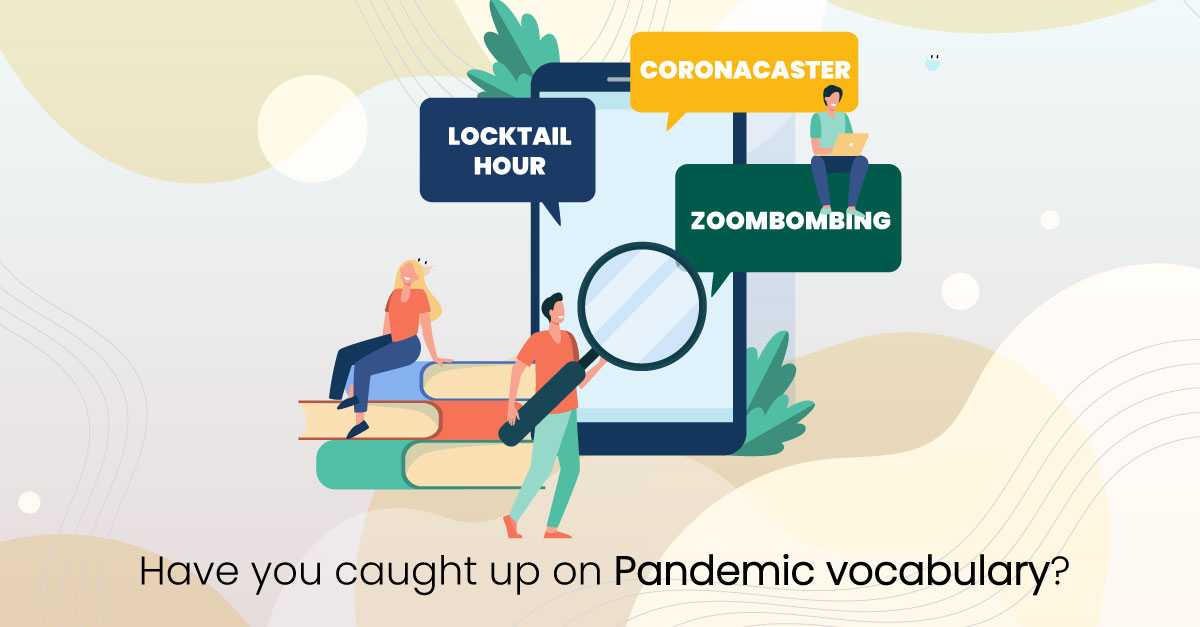Finding a new word is like finding a shiny new coin on the kerb. It is round on the edges, rich in promise, sparkling in coinage. Think of the year 2013, when ‘selfie’ was the word of the year. It conjured images of sunlight shining off a phone camera, the perfect pout, the impressive angle, and the Insta-worthy, Insta-ready mood of the hour. Owing to current times, let’s peep into our Pandemic Vocabulary, shall we?
Fast forward to 2021; the pandemic year has brought a slew of new words that have ranged from the dismal to the exciting. To begin with – the word of the year in 2020 was ‘lockdown,’ which will always bring back memories of fear-filled days, empty streets and a virus lurking around the corner.
Then again, the word ‘locktail hour’ brings memories of raising a toast to a friend online at the end of a busy work-from-home day during the lockdown.
Why are new words important when it comes to business writing?
The answer to this question lies in business writing, which provides relevant information and gets your message across in the most effective way possible. And, since the keyword in the business world is ‘relevance,’ it is crucial to stay in tune with new communication methods with the right words in changed life contexts.
Using life-centric vocabulary can make content, both business and news, fresh and fascinating.
Here are some of the new words from last year that should take pride in your pandemic vocabulary.
The Bio-bubble:
The word, ‘bio-bubble,’ which means a safe and secure environment that is cordoned off from the outside world to reduce the chance of infection, is a part of the lexicon of many sports anchors today. Other than protection and isolation, it is useless in any different context, but there are many spin-offs to the equally exciting phrase. There are words like ‘bio-secure’ about staying safe from virus attacks and the ‘travel bubble,’ which is the term used to describe the agreement between a set of countries to open their borders.
Widespread Usage: Cricket chiefs have increased the security of their star players ahead of important matches and make sure that all the teams are in strict bio-bubbles during the pandemic.
The Coronial
So, we’ve all heard of the Baby Boomers, Generation X, the Xennials, the Millennials, Gen Y and Gen Next, but here’s the new one- The Coronial. The term refers to the generation of children conceived or born during the COVID-19 pandemic.
It is a helpful word to know as the baby-boom is the reality of the day. It is estimated, according to a report by UNICEF, that around 116 million babies were born during this period.
Widespread Usage: Parents of young Coronials will never forget the year 2019 when the pandemic hit the world.
Zoombombing
This word crept into our pandemic vocabulary when unwanted disruptions occurred in Zoom meetings orchestrated by internet trolls. If you use Zoom without the proper precautions, uninvited attendees can be a part of your meetings and may even share graphic and pornographic images and content with your audience.
Widespread Usage: A clothing company fell victim last week to Zoombombing during their annual meeting when online invaders attacked their Zoom calls.
The Coronacoaster
Remember the time we would use the word ‘rollercoaster’ to describe our emotions during the ups and downs of our lives, especially if we were juggling many things, like child-care, grueling office hours and long commutes.
Today, the new word is ‘Coronacoaster,’ which is an apt way to describe the ups and downs of our moods during the pandemic, especially since most of us are elated one minute and weepy the next.
Widespread Usage: The mood swings that women faced during the lockdown due to the pandemic seemed to be on an emotional Coronacoaster all day long.
Patient Zero
Oh, how we love the words that go with ‘zero.’ Right from Ground Zero, which is the primary center of a disaster, to zero-dark-thirty, the time in the early morning before the sun has risen. Then comes the zero hour, the time when something starts. Numerous suffixes go with ‘zero.’ The phrase, Patient Zero, which took center stage in the 1980s, is back in circulation to describe the first person to exhibit symptoms of an illness.
Widespread Usage: A 9-year-old boy was was quarantined right away after being identified as Patient Zero during the disease outbreak.
If you love new words and phrases, keep adding them to your business vocabulary to enrich your content and capture this era in history.
Pandemic vocabulary is all set to increase as coronavirus cases continue to soar and more lockdowns seem imminent.
Many of us may soon be back to drinking quarantinis (cocktails made at home and drunk alone)and going back to our Co-video parties (online parties held during COVID-19) to get through one of the most trying periods in history in recent times.
Read Next: Structuring Thoughts for Engaging Stories


